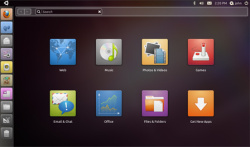Ubuntu to replace GNOME Shell with Unity
![]() At this week's Ubuntu Developer Summit, Ubuntu founder Mark Shuttleworth announced that Unity, developed in-house by the Ubuntu developers, will become the distribution's default desktop in the forthcoming version 11.04, code named "Natty Narwhal". In the current 10.10 release, Unity is in use, but only on netbooks. In making the switch, Shuttleworth has delivered a clear rebuff to the GNOME Shell, which adds new means of operation to the forthcoming GNOME version 3. Since Unity is also based on GNOME libraries, GNOME applications can be used under Unity without requiring adaptation. Its own desktop will, however, set Ubuntu apart more clearly from other distributions.
At this week's Ubuntu Developer Summit, Ubuntu founder Mark Shuttleworth announced that Unity, developed in-house by the Ubuntu developers, will become the distribution's default desktop in the forthcoming version 11.04, code named "Natty Narwhal". In the current 10.10 release, Unity is in use, but only on netbooks. In making the switch, Shuttleworth has delivered a clear rebuff to the GNOME Shell, which adds new means of operation to the forthcoming GNOME version 3. Since Unity is also based on GNOME libraries, GNOME applications can be used under Unity without requiring adaptation. Its own desktop will, however, set Ubuntu apart more clearly from other distributions.
Shuttelworth explained the reasons behind the decision to Ars Technica; the Ubuntu Project and GNOME have very different ideas about how a user-friendly desktop should look. Ubuntu considers the Zeitgeist framework, which will allow users to search for content using criteria such as 'the song I listened to yesterday afternoon', to be crucial; GNOME, by contrast, has removed Zeitgeist from the default software pool in GNOME 3. Shuttleworth considers a new search and activity-oriented paradigm for dealing with content to be essential for dispensing with the old file and folder model.

![]() Ubuntu's new Unity desktop.
Technically, Unity and GNOME Shell are not so far apart. Both are based on the GNOME libraries and on the GUI toolkit Clutter, which is also used by Google's Chrome OS and Nokia and Intel's MeeGo project. The GNOME Shell uses Mutter as its windows manager, whereas Unity relies on Compiz – both desktops require hardware support for 3D graphics. Unity also supports Ubuntu's own indicator system, an extension to GNOME's panel applets, whereas applets will not initially be usable with GNOME Shell.
Ubuntu's new Unity desktop.
Technically, Unity and GNOME Shell are not so far apart. Both are based on the GNOME libraries and on the GUI toolkit Clutter, which is also used by Google's Chrome OS and Nokia and Intel's MeeGo project. The GNOME Shell uses Mutter as its windows manager, whereas Unity relies on Compiz – both desktops require hardware support for 3D graphics. Unity also supports Ubuntu's own indicator system, an extension to GNOME's panel applets, whereas applets will not initially be usable with GNOME Shell.
GNOME developers have expressed disappointment at the decision – they fear a fragmentation of the GNOME desktop and difficulties for application developers who now need to support two desktops. Shuttleworth counters that interfaces for integrating applications with the desktop have been standardised by the Freedesktop Initiative. He believes that competition will have an positive overall effect on the GNOME ecosystem.
See also:
- Ubuntu 11.04 development begins, a report from The H.
- First GNOME 3.0 development release arrives, a report from The H.
- Canonical releases Ubuntu 10.10 "Maverick Meerkat", a report from The H.
(crve)
![Kernel Log: Coming in 3.10 (Part 3) [--] Infrastructure](/imgs/43/1/0/4/2/6/7/2/comingin310_4_kicker-4977194bfb0de0d7.png)

![Kernel Log: Coming in 3.10 (Part 3) [--] Infrastructure](/imgs/43/1/0/4/2/3/2/3/comingin310_3_kicker-151cd7b9e9660f05.png)
















